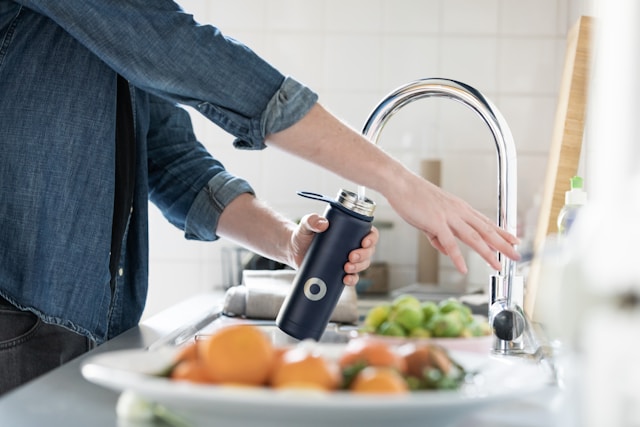Comprehending the Types and Advantages of Domestic Water Purification Systems
Key Takeaways:
- Unearth various water filtration systems, understand how they operate, and determine which is best for your home needs.
- Recognize the multitude of health benefits filtered water provides, including reducing contaminants and improving skin and hair health.
- Gauge the long-term economic and profound environmental impacts of investing in a home water filtration system.
- Explore the current and forthcoming technological improvements in water filtration and consider how they could reshape our approach to water purity.
Table of Contents
- Introduction to Water Filtration
- Types of Water Filtration Systems
- The Health Benefits of Filtered Water
- Economic Advantages of Home Water Filtration
- Environmental Impact of Water Filtration
- Understanding Water Filtration Technologies
- Installation and Maintenance of Water Filtration Systems
- The Role of Water Quality Testing
- Case Studies: Transformations with Water Filtration
- Future Trends in Water Filtration Technology
Introduction to Water Filtration
Unlock the clarity behind the elemental water filtration process—a necessary cornerstone for maintaining a pure and safe water supply within our homes. This fundamental practice encompasses removing various unwanted elements, such as sedimentary particles, undesirable tastes and odors, and more hazardous contaminants, thereby producing water that’s not only clean but also consistent with health standards. Among the myriad techniques utilized for water purification Tampa citizens apply, it’s crucial to navigate through the options to find a tailored solution that resonates with the unique challenges of one’s local water conditions. Water quality often needs to catch up to our expectations, as there is a surprising array of pollutants in our domestic water supply.
Carbon Filtration: How it Works
Activated carbon filters are pivotal in water purification, serving as a magnet for various impurities. The active carbon possesses a porous structure and a large surface area, facilitating the efficient trapping of contaminants through adsorption. When water transits through this activated carbon filter, myriad impurities—from chlorine and odor to certain organic compounds—are effectively removed, allowing the outputs of such filtration to yield cleaner and more palatable water.
Reverse Osmosis Systems and Their Effectiveness
Reverse osmosis systems offer a more thorough purification process that remarkably effectively reduces pollutants. The core mechanics involve pressurized water flow through a semi-permeable membrane; its purpose is to let only water molecules pass through, leaving behind pollutants such as heavy metals, dissolved salts, and most bacteria and viruses. This level of filtration lends itself ideally to homes where water quality is of grave concern, providing a vital barrier against many waterborne impurities.
Ultraviolet Purification: An Overview
Ultraviolet purification stands out as a formidable, eco-friendly disinfection technique. By subjecting water to a precise wavelength of UV light, this method directly targets the genetic core (DNA) of bacteria and viruses, thereby sterilizing them. Ultraviolet light disrupts their reproductive functions without chemicals, ensuring nothing but irradiated water is produced. This method is integral for those primarily concerned about microbiological contaminants, offering protection without altering the chemical composition of the water.
The Health Benefits of Filtered Water
The benefits of using a home water filtration system ripple far beyond clear water—it significantly enhances the water quality we consume, thus championing our health. Sourcing water devoid of chlorine, lead, and other harmful chemicals reduces the risk of associated illnesses while fostering a more robust immune system. Beyond consumption, the positive effects extend to daily use; filtered water contributes to better absorption and hydration, which is pivotal for maintaining equilibrium within the body’s complex systems.
Water that has been noticeably softened after being treated by filtration can significantly improve the condition of your skin and hair. The absence of harsh minerals and contaminants allows for more gentle cleansing, resulting in healthier skin and luscious hair. This significant difference particularly resonates with individuals suffering from eczema or sensitive skin, exemplifying the everyday health impacts of installing a home water filtration system.
Economic Advantages of Home Water Filtration
Delving into the cost-benefit analysis of installing a home water filtration system reveals potent economic incentives. One of the most tangible savings is the decreased dependence on bottled water—a significant household expenditure and a less sustainable option for hydration. By opting for filtered tap water, the reduction in recurring expenses is not just beneficial for your wallet but also the ecosystem. Moreover, appliances that utilize water, like washing machines and dishwashers, operate more efficiently and endure fewer maintenance issues when supplied with filtered water, extending their lifespan and saving homeowners on potential repair costs.
An often-overlooked advantage is the augmentation of property value; a house equipped with a modern water filtration system is often more appealing to conscious buyers, who value the added guarantee of a pure water supply. Therefore, this addition to a home’s infrastructure can be viewed not only as an improvement to daily life but also as a strategic investment in one’s property’s future marketability.
Environmental Impact of Water Filtration
Discerning the broader environmental ramifications of adopting a home water filtration system is illuminating. The pivot from bottled water consumption to reliance on filtered tap water is a solid stance against plastic waste proliferation. Millions of plastic bottles are disposed of each year, and individuals can substantially cut down on their plastic footprint by consciously choosing to filter tap water. Furthermore, the life-cycle analysis of bottled water indicates a significant environmental burden through carbon emissions during its production and transportation phases—the avoidance of which is an instant boon for eco-conscious individuals.
Considering the global challenge of water conservation, it is noteworthy that advanced water filtration systems actively reduce wastage. These systems are engineered to be more water-efficient, ultimately returning clean water to the environment in a state closer to its natural cycle, thereby reinforcing sustainable living practices.
Understanding Water Filtration Technologies
Embarking upon the intricacies of water filtration technology broadens our capacity to select the most fitting systems for our unique water-quality issues. Each type of technology—from activated carbon filters, which use a form of carbon with a high degree of porosity to remove pollutants, to sophisticated reverse osmosis systems, which exclude contaminants through a finely gauged membrane—caters to specific filtration expectations and needs. The more one delves into the operational characteristics of these systems, the more precise the path to choosing an effective solution for one’s home becomes. Additionally, UV purification technologies offer a chemical-free and energy-efficient option, destroying harmful pathogens through light exposure, further expanding the scope of available water filtration methods.
Understanding the mechanics behind each type of filtration technology is as crucial as the technology itself. For instance, learning that activated carbon works by adsorbing contaminants onto its surface or that reverse osmosis membranes must remain intact to prevent impurity seepage will go a long way in maintaining these systems. This blend of knowledge and maintenance ensures these technologies safeguard the water supply effectively.
Installation and Maintenance of Water Filtration Systems
Selecting the appropriate water filtration system for your home involves carefully considering the options available today. Factors such as the specific contaminants in your water supply, household water usage, and budget constraints play a fundamental role in this decision. While adept homeowners may feel comfortable tackling the installation of some filtration systems on their own, securing professional installation services guarantees optimal functionality and coverage against unforeseen complications—a worthwhile investment for ensuring the system’s reliability and efficiency.
Maintenance is a critical aspect of owning any water filtration system. Whether it’s the periodic replacement of filters, the sanitation of storage tanks, or the comprehensive servicing of complex mechanical components, consistent attention to upkeep upholds the quality and purity of the water. This is a brisk reminder that the neglect of such tasks may not only compromise the quality of the water but could also potentially nullify the filtration system’s efficacy.
The Role of Water Quality Testing
Integral to the pursuit of pristine water within our homes is water quality testing—a proactive measure that should be employed regularly. Testing provides a precise snapshot of the water’s makeup, enabling the early detection of contaminants and potentially hazardous elements. The data from these tests serve as an authoritative guide in selecting and adjusting water filtration systems, thus ensuring a tailored response to specific water quality challenges.
Case Studies: Transformations with Water Filtration
Personal testimonies and case studies showcase the transformative power of installing the right water filtration system. They affirm the palpable benefits of water filtration in general and highlight tangible improvements within households—such as the marked difference in water taste and softness post-filtration, especially in regions plagued by challenging water problems. Homeowners’ voices bring to life the narrative that water filtration is less of a luxury and more of an essential upgrade to our daily living standards.
Future Trends in Water Filtration Technology
The horizon of water filtration technology is witnessing a surge of innovations, as highlighted by recent trends forecasting the evolution of increasingly smart, energy-efficient systems. These emerging technologies promise advanced levels of water treatment and more significant user interaction through real-time monitoring capabilities, where systems will filter, proactively analyze, and communicate about water usage and quality levels. Such forward-thinking designs portend a new era of water filtration that intersects seamlessly with our smart homes and connected lifestyles.



